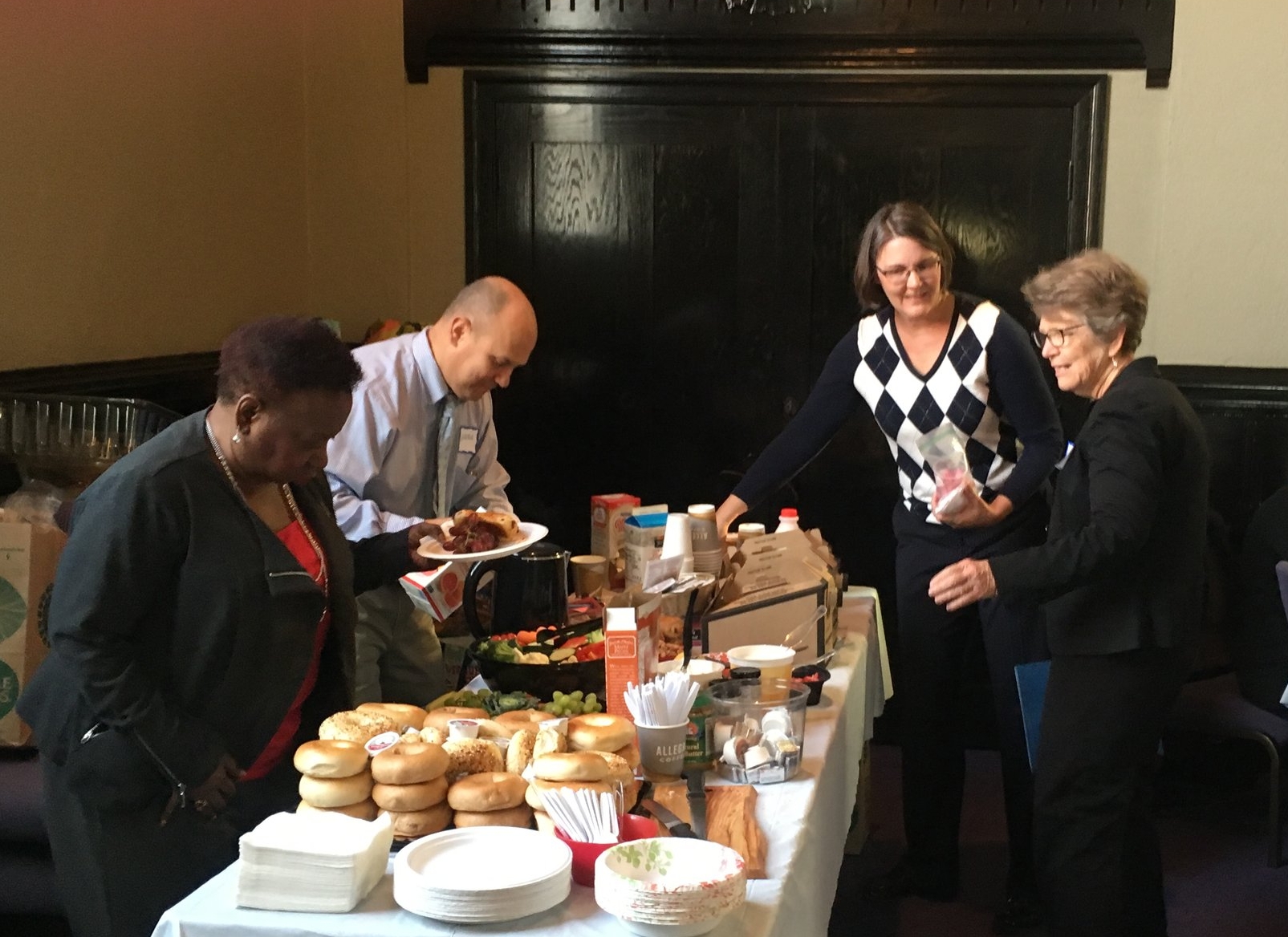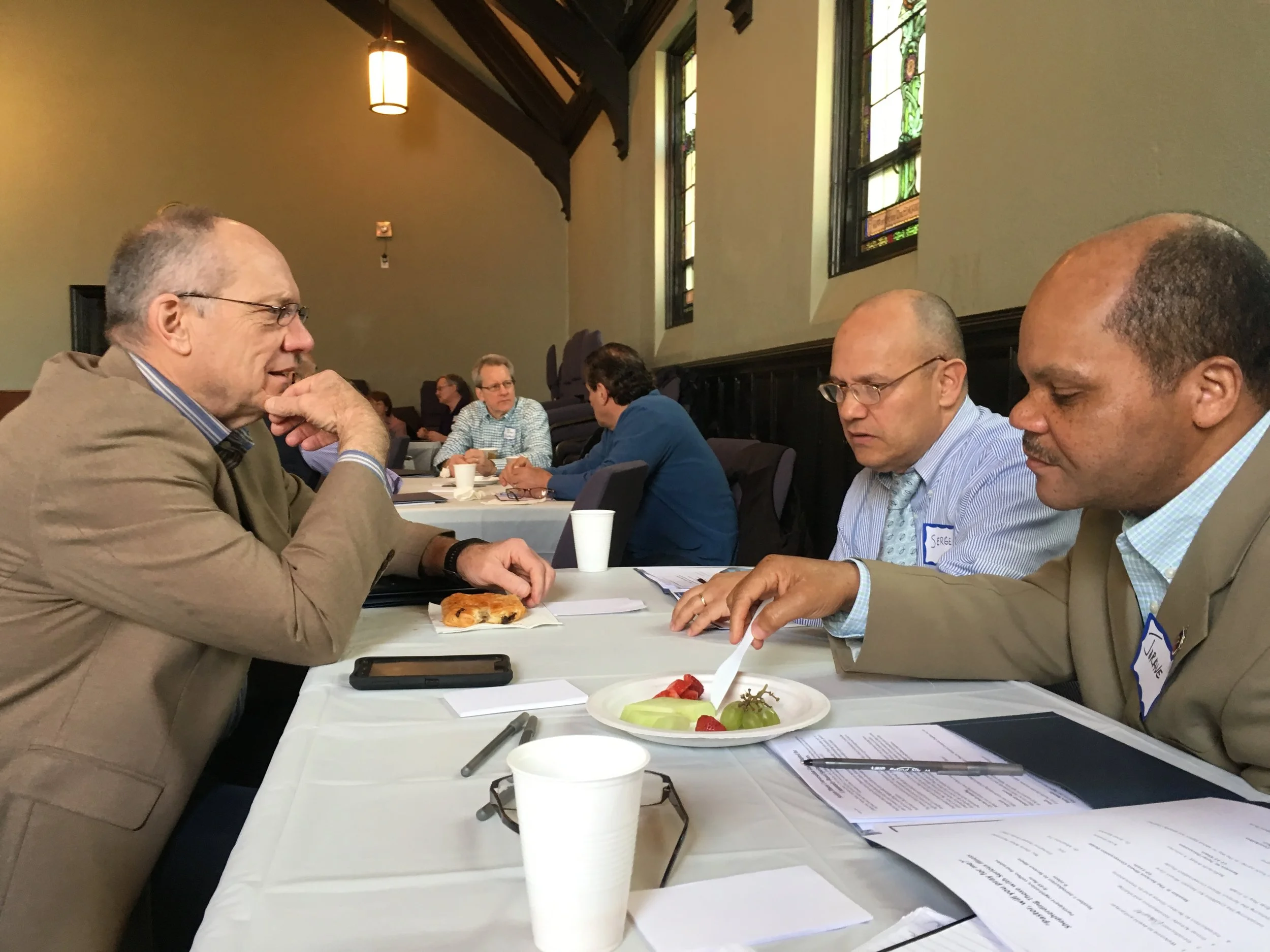
BLOG: APPLIED RESEARCH OF EMMANUEL GOSPEL CENTER
Shepherding the Seriously Ill: 3 Workshop Takeaways
Serious illness brings up serious questions, both medical and spiritual. Pastors and caregivers with the right training can help families and medical professionals honor the sick person’s values. Here are three takeaways from a Boston workshop for physicians, pastors, and other caregivers, called “Pastor, Will You Pray with Me? Shepherding Those With Serious Illness.”
Shepherding the Seriously Ill: 3 Workshop Takeaways
By Bethany Slack, MPH, MPT, and Evangeline Kennedy
Serious illness brings up serious questions—for both patients and their families. Individuals facing the end of their life often call on Christian leaders for support in their time of grief and questioning. With the right training, pastors and other caregivers can play a crucial role in helping medical staff and family decision-makers honor the ill person's wishes in a manner consistent with his or her beliefs and values.
In April, Emmanuel Gospel Center, in conjunction with Greater Boston Baptist Association and Blue Cross Blue Shield, facilitated the workshop Pastor, Will You Pray For Me? Shepherding Those with Serious Illness. Bethel AME Church hosted the morning workshop, which featured local pastors and clinicians as speakers. The gathering gave pastoral caregivers:
an orientation to the world of end-of-life care
a tool for open communication between pastoral caregivers and seriously ill congregants
an opportunity to network with diverse pastoral caregivers shepherding the seriously ill in their faith communities.
Pastoral caregivers from 15 local churches and organizations from Greater Boston gathered to discuss helpful approaches and tools for shepherding individuals with serious illness.
TAKEAWAYS
We asked participants what elements and discussion points of the workshop were most valuable to them.
1. Talking About Serious Illness Presents Emotional Challenges
Caregivers, patients, and their family members experience mental and emotional obstacles to serious illness conversation.
Workshop participants spoke of their sadness, emotional ties to patients, and their desire to engage more confidently and proficiently in conversations around serious illness.
These caregivers also noted that the patients and families were often reluctant or completely unwilling to deal openly and realistically with the situation. One participant said "Some people don't want [to] talk about these issues/answer these kinds of questions. Sometimes they don't know how to think about [it]." Disagreement between a patient and their spouse adds another layer of emotional challenge to such conversations.
Another noted the challenge of talking openly about serious illness amidst "fierce reliance on a miraculous healing."
However, participants mentioned the Conversation Guide (described below) as a helpful tool for approaching these anticipated barriers.
2. The Conversation Guide Helps
The "Serious Illness Conversation Guide" for caregivers was the most important takeaway for many participants. The Guide offers a list of specific questions as a tool for initiating and navigating serious illness conversations.
The caregivers valued the Guide content as well as the opportunity to practice using it through role play. One participant responded, "I need to ask some people some of these questions now!"
Some also appreciated the specific directives for using the Conversation Guide, including that:
repeating the same questions is effective
having the Guide in hand during conversations is perfectly acceptable
“Every situation is different and should be approached prayerfully.”
Panel discussion: (left to right) Dr. Michael Balboni (speaking), Dr. Janet Abrahms, Dr. Gloria White-Hammond, and Dr. Alexandra Cist.
3. Medical Decisions are Spiritual
Participants valued learning about clinicians' and pastors' complementary roles in helping Christians navigate decision-making consistent with their spiritual beliefs. One person summed up his/her thoughts with a quote from Dr. Michael Balboni, "Medical decisions are spiritual decisions."
The degree of overlap between the medical and spiritual spheres in serious illness decision-making surprised many participants. One caregiver was struck by the number of Guide questions he perceived as “clinical”. Another appreciated hearing the perspectives of the four-person panel, which included individuals working as physicians, pastors, or both.
“Medical decisions are spiritual decisions.”
Another participant summed up the event as, "Every situation is different and should be approached prayerfully."
TAKE ACTION
If you're a pastoral caregiver interested in learning more about shepherding those with serious illness, consider joining us for our next workshop!
Learn More
Some Thoughts on Ministering to the Sick and Dying - The Gospel Coalition
"Where's God?" Counsel for the Sick and Dying - Biblical Counseling Coalition
Pastoral Visitation Resources - Head Heart Hand
Bethany is EGC's Public Health & Wellness research associate. Her passion is to see Jesus’ love translated into improved health and health justice for all, across the lifespan and across the globe.
Evangeline Kennedy was a Summer 2018 Applied Research and Consulting intern at EGC. She studies Public Health and Spanish at Simmons University. Her heart for the city continues to grow as she sees the vitality and vibrancy present in Boston and the work God is doing in churches and among Christian leaders.
A Good Death: The Benefits of Talking About End of Life
What is the impact of spiritual community on end of life care? The truth may surprise you. Talking openly about End of Life issues benefits individuals, families, and communities.
A Good Death: The Benefits of Talking about End of Life
by Bethany Slack, MPH, MT
“For everything there is a season, and a time for every matter under heaven: a time to be born, and a time to die…” - Ecclesiastes 3:1-2a
As human beings, we all share the common experiences of birth and death. But we tend to focus our time and energy planning, living out, and seeking to improve our time here on earth. Many of us give little attention to how we wish to experience the end of earthly life.
Passage into extreme old age or the discovery of terminal illness can stir up confusion and conflicting desires. Miscommunication with family and medical staff is common.
If we have avoided discussing End of Life (EOL) issues as families, churches, and communities, there are usually medical, relational, financial, and spiritual ramifications. But open conversation benefits both the individual and the community.
You May Be Surprised To Learn
Research indicates that 80% of people would like to die at home, yet only about one third do.
Dying in a hospital is pricier and comes with more aggressive treatments than dying in other facilities or at home.
Hospice services offer treatments that make a terminally ill person comfortable at the end of life, and more people than ever are choosing to receive hospice care.
Persons with terminal cancer who are part of a highly supportive spiritual community are more likely to receive aggressive care and die in the hospital, rather than choose hospice or home care.
Among those with highly supportive spiritual communities, racial/ethnic minorities and those reporting strong reliance on God are even more likely to receive aggressive treatments at the end of life.
Introducing a Boston Public Health and Wellness Initiative
The Public Health and Wellness (PH&W) initiative at the Emmanuel Gospel Center is beginning to explore such end of life questions, building on our ministry partners’ wisdom, insights, and contributions to the field.
Observing the needs of her own congregation, Rev. Gloria White-Hammond, M.D. of Bethel AME Church began Planning Ahead, a ministry to encourage discussion of EOL issues and advance directives. Michael Balboni, Ph.D., Th.M., affiliated with Harvard Medical School and the Dana-Farber Cancer Institute, has published extensively about the role of spirituality and spiritual care in medicine and end of life care. Both have a desire to see EOL issues more widely engaged in faith communities.
With Dr. White-Hammond and Dr. Balboni, the PH&W initiative is planning a 2017 convening in the Boston area with the hope of connecting pastors and other Christian leaders with medical professionals. We hope to spark a new vision in faith communities of what a “good death” can look like, and how planning for good deaths can benefit and bless our city and society.
Take Action
1. Learn more about the current state of EOL in the United States.
2. Connect with me for further conversation.
3. Financially support the Public Health & Wellness Initiative at EGC.
Bethany Slack, MPH, MT, is the Public Health and Wellness research associate at EGC. Her passion is to see Jesus’ love translated into improved health and health justice for all, across the lifespan and across the globe.
Keywords
- #ChurchToo
- 365 Campaign
- ARC Highlights
- ARC Services
- AbNet
- Abolition Network
- Action Guides
- Administration
- Adoption
- Aggressive Procedures
- Andrew Tsou
- Annual Report
- Anti-Gun
- Anti-racism education
- Applied Research
- Applied Research and Consulting
- Ayn DuVoisin
- Balance
- Battered Women
- Berlin
- Bianca Duemling
- Bias
- Biblical Leadership
- Biblical leadership
- Black Church
- Black Church Vitality Project
- Book Recommendations
- Book Reviews
- Book reviews
- Books
- Boston
- Boston 2030
- Boston Church Directory
- Boston Churches
- Boston Education Collaborative
- Boston General
- Boston Globe
- Boston History
- Boston Islamic Center
- Boston Neighborhoods
- Boston Public Schools
- Boston-Berlin
- Brainstorming
- Brazil
- Brazilian
- COVID-19
- CUME
- Cambodian
- Cambodian Church
- Cambridge














![Barriers to Mental Health Care for Boston-Area Black Residents [Report]](https://images.squarespace-cdn.com/content/v1/57ff1c7ae58c62d6f84ba841/1518458267039-7WI3NJUWYJQKOQCYDWTK/pexels-photo-561654.jpeg)














